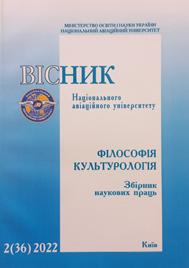MODERN EDUCATION IN THE CONTEXT OF INTER-CIVILIZATIONAL RELATIONS
DOI:
https://doi.org/10.18372/2412-2157.36.16977Keywords:
civilization, competition, holistic education, system approach, axiological approach, valuesAbstract
Introduction. The current stage of human development requires the education system to review the worldview principles aimed at
finding commonalities between civilizations, co-evolutionary strategies for the interaction of communities, nature, and society, focused
on cooperative relations between people in particular, and civilizations in general. That is why research is relevant in that education is
considered as a resource capable of improving tolerant relations between civilizations. The aim of the article is to understand the
current state of education in the context of inter-civilizational relations. The task is to analyze the works that talk about the existence of
modern sociocultural communities and to outline the educational problems that arise on the basis of the features of contemporary intercivilizational
relations. Research methods are general scientific and special methods and approaches used for the study of education
in the context of inter-civilizational relations, one of which is a systematic approach aimed at revealing the integrity of pedagogical
objects (inter-civilizational relations in the field of education), identifying various types of connections in them, and unifying into a single
theoretical picture. Research results. Modern social consciousness considers education an external factor. The external factor is
subordinated to the internal one, according to which the idea of the value of education as a life strategy is established in the social
consciousness. To study the internal factor, an axiological approach is appropriate, in the context of which the value differences
between civilizations are investigated as the reason for their possible collisions of a threatening nature. In the context of intercivilizational
relations, the actualization of education problems is due to the reassessment of values and the search for the content of
universal human identity. A manifestation of the revaluation of values was the activation of the civilizational vision of the world as the
unity of diversity, including in the field of education, on the basis of common human tasks and values. Nowadays, holistic education is
being created, which is based on the integration of different types of worldview as equal, complementary, and partnership. Discussion.
The process of rapid civilizational progress will not cover all humanity equally for a long time. And therefore expect the formation of the
specified type of education in all countries of the world. However, a prerequisite for weakening the confrontation is already being
created, which is education in the spirit of peace and cooperation, understanding the shared fate of humanity, tolerance, and respect.
Conclusions. The convergence of education systems will contribute to the convergence of states, peoples, cultures, and civilizations on
the basis of axiological commonality, that is, the sphere of basic values and higher goals. This gives rise to the hope that civilizations,
despite significant differences, will converge in the spiritual sphere, and this will help avoid the possible self-destruction of humanity.
References
Huntington Samuel P. The Clash of Civilizations and the Remaking of World Order. New York: Simon & Schuster, 1996. 367 p.
Robertson D. S. The information revolution. Communication researches. New York, 1990. Vоl.17. URL: https://journals.sagepub.com/doi/abs/10.1177/009365090017002005/
Антонюк Т. Міжнародне співробітництво та інтеграція у галузі освіти як важливий фактор конкурентоспроможності української освітньої системи. Наукові записки. Серія «Історичні науки». 2013. Вип.21. С. 149-155.
Дротянко Л. Особливості диверсифікації закладів вищої освіти в інформаційну епоху. Вісник Національного авіаційного
університету. Серія: Філософія. Культурологія. 2010. № 1(11). С. 9-13.
Карсаєвська Т. В., Єрмоленко М. Т. Освіта у ситуації глобальних викликів: філософський аспект. Філософія освіти. Серія «Symposium». 2002. Вип. 23. C. 265-275.
Кірсанов А. І. С. Хантінгтон про «Зіткнення цивілізацій» у контексті глобальних трансформацій. Філософія та суспільство.
№3. С. 32-43.
Скотна Н. В., Ашиток Н. І. Вища освіта в епоху глобалізації. Вісник Національного авіаційного університету. Серія: Філосо-
фія. Культурологія. 2013. № 2(18). С. 87-90.
Сух Ян, Вишневський Януш. Доля сучасних цивілізацій у перспективі уніфікації світової економіки. Історія та сучасність.
№1. URL: https://www.socionauki.ru/journal/articles/145570/
Яковенко І. Г. Цивілізаційний аналіз, проблема методу. Проблеми історичного знання. М: Наука, 1999. С. 84-92.

